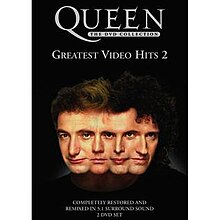
Queen are a British rock band formed in London in 1970 by Freddie Mercury, Brian May, and Roger Taylor, later joined by John Deacon (bass). Their earliest works were influenced by progressive rock, hard rock and heavy metal, but the band gradually ventured into more conventional and radio-friendly works by incorporating further styles, such as arena rock and pop rock.

"Under Pressure" is a song by the British rock band Queen and singer David Bowie. Originally released as a single in October 1981, it was later included on Queen's 1982 album Hot Space. The song reached number one on the UK Singles Chart, becoming Queen's second number-one hit in their home country and Bowie's third, and also charted in the top 10 in more than 10 countries around the world.
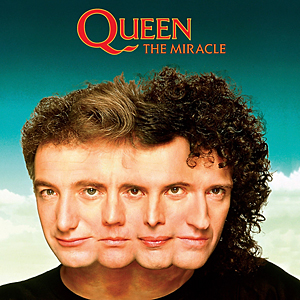
The Miracle is the thirteenth studio album by the British rock band Queen, released on 22 May 1989 by Parlophone Records and Capitol Records in both the United Kingdom and the U.S. respectively, where it was the band's third and final studio album to be released on latter label, and their first studio album on the former label. The album was recorded as the band recovered from Brian May's marital problems and Freddie Mercury's HIV diagnosis in 1987. Recording started in January 1988 and lasted for an entire year. The album was originally going to be called The Invisible Men, but three weeks before the release, according to Roger Taylor, they changed the name to The Miracle. It was also the last Queen album with a photo of the band on the front cover.
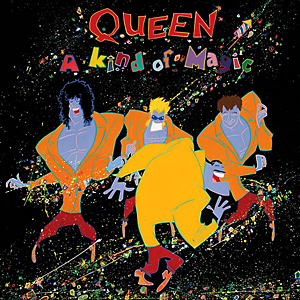
A Kind of Magic is the twelfth studio album by the British rock band Queen, released on 2 June 1986 by EMI Records in the UK and by Capitol Records in the US. It is based on the soundtrack to the film Highlander, directed by Russell Mulcahy.

Hot Space is the tenth studio album by the British rock band Queen. It was released on 4 May 1982 by EMI Records in the United Kingdom and by Elektra Records in the United States. Marking a notable shift in direction from their earlier work, they employed many elements of disco, funk, R&B, dance, pop and new wave music on the album. Combined with the ongoing backlash against disco music, this made the album less popular with fans who preferred the traditional rock style they had come to associate with the band. Queen's decision to record a dance-oriented album germinated with the massive success of their 1980 hit "Another One Bites the Dust" in the US.

William Haislip Squier is an American musician, singer, and songwriter who had a string of arena rock and crossover hits in the early 1980s. His best-known songs include "The Stroke", "Lonely Is the Night", "My Kinda Lover", "In the Dark", "Rock Me Tonite", "Everybody Wants You", "Emotions in Motion", "Love Is the Hero", and "Don't Say You Love Me". Squier's best-selling album, 1981's Don't Say No, is considered a landmark release of arena rock, bridging the gap between power pop and hard rock.

"I Want to Break Free" is a song by the British rock band Queen, written by their bassist John Deacon. It appears on the album The Works (1984), and was released in three versions: album, single and extended. The track became a staple of the band's 1984–85 Works Tour and their 1986 Magic Tour.
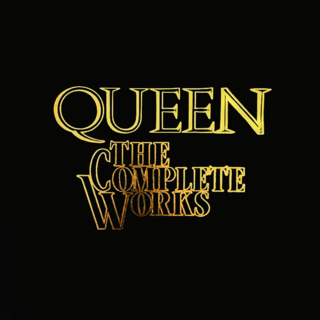
The Complete Works is a box set issued by the rock band Queen in 1985. It contained all of the band's original studio albums, live album and non-album tracks to that point. It was available in vinyl format only.
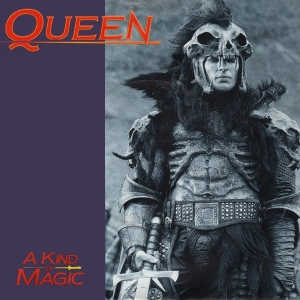
"A Kind of Magic" is the title track of the 1986 album of the same name by the British rock band Queen. It was written by the band's drummer, Roger Taylor, for the film Highlander and featured as the ending theme. The single reached number three in the UK Singles Chart, top ten in a number of European countries, and #42 on the US Billboard Hot 100. The song is the opening track on the band's compilation albums, Greatest Hits II, and Classic Queen.
Queen Live at WembleyStadium, also referred to as Queen Live At Wembley, Queen At Wembley, Queen Live At Wembley '86, Live At Wembley and Live At Wembley '86, is a live concert by British rock band Queen at Wembley Stadium, London, England on Saturday 12 July 1986. The recording is a performance of the Magic Tour which took place during the summer of 1986.

"One Vision" is a song written and recorded by the British rock band Queen, first released as a single in November 1985 and then included on their 1986 album A Kind of Magic. It was conceived by the group's drummer Roger Taylor.

"Princes of the Universe" is a song written by Freddie Mercury and performed by the British rock band Queen, originally released as a single in the United States on March 12, 1986, via Capitol Records. The song was written for the film Highlander, and released on the album A Kind of Magic, which also featured other selections from the Highlander song score on June 2, 1986. In 1999 it was included in Queen's compilation album Greatest Hits III.

"Who Wants to Live Forever" is a song by the British rock band Queen. A power ballad, it is the sixth track on the album A Kind of Magic, which was released in June 1986, and was written by lead guitarist Brian May for the soundtrack to the film Highlander. Queen was backed up by an orchestra, with orchestrations by film score composer Michael Kamen. The song peaked at No. 24 in the UK charts. In 1991, it was included in the band's second compilation album, Greatest Hits II.

"I Want It All" is a song by British rock band Queen, featured on their 1989 studio album, The Miracle. Written by guitarist and vocalist Brian May and produced by David Richards, it was released as the first single from the album on 2 May 1989. "I Want It All" reached number three on the singles charts of the United Kingdom, Finland, Ireland and New Zealand, as well as on the US Billboard Album Rock Tracks chart. Elsewhere, it peaked at number two in the Netherlands and charted within the top 10 in Australia, Belgium, Germany, Norway and Switzerland. With its message about fighting for one's own goals it became an anti-apartheid protest song in South Africa.

The Works is the eleventh studio album by the British rock band Queen. It was released on 27 February 1984 by EMI Records just shortly after recording for the album had been completed in the United Kingdom and it is the band's first studio album to be released by Capitol Records in the United States. After the synth-heavy Hot Space (1982), the album saw the re-emergence of Brian May and Roger Taylor's rock sound, while still incorporating the early 80s retro futuristic electronic music and New York funk scenes. Recorded at the Record Plant Studios in Los Angeles, California, and Musicland Studios in Munich, Germany, from August 1983 to January 1984, the album's title comes from a comment Taylor made as recording began – "Let's give them the works!".
David Richards was an English record producer, engineer and musician. He was based in Switzerland in the Mountain Studios in Montreux, owned by the rock band Queen, and in Attalens, where he engineered and co-produced many albums by Queen, David Bowie and other artists. Richards also played keyboards on some records and dealt with live music recording in such events as Montreux Jazz Festival.

Mountain Studios was a commercial recording studio founded by American singer and composer Anita Kerr and her husband Alex Grob in 1975 within the Montreux Casino in Montreux, Switzerland. The studio was under the ownership of Queen and then long-time Queen producer David Richards from 1979 until 2013, after which it became the charity museum/exhibition Queen: The Studio Experience, benefitting the Mercury Phoenix Trust.

"Say Say Say" is a song by Paul McCartney and Michael Jackson, released in October 1983 as the lead single from McCartney's 1983 album Pipes of Peace. Produced by George Martin, it was recorded during production of McCartney's 1982 Tug of War album, about a year before the release of "The Girl Is Mine", the pair's first duet from Jackson's album Thriller (1982).

Queen – Live In Budapest was retitled later as Hungarian Rhapsody: Queen Live in Budapest is a concert film of the British rock band Queen's performance at the Népstadion in Budapest on 27 July 1986. It was part of the band's final tour with original lead singer Freddie Mercury, The Magic Tour. Queen were one of the few bands from Western Europe to perform in the Eastern Bloc during the Cold War. The film had a limited theatrical release in Eastern Bloc countries in 1987/1988 with the concert physically released on VHS and Laserdisc in the UK and Japan on 16 February 1987 under the original title Queen Live In Budapest, and on CD, DVD and Blu-ray for the first time on 5 November 2012 worldwide, except in the United States where it was released a day later.
